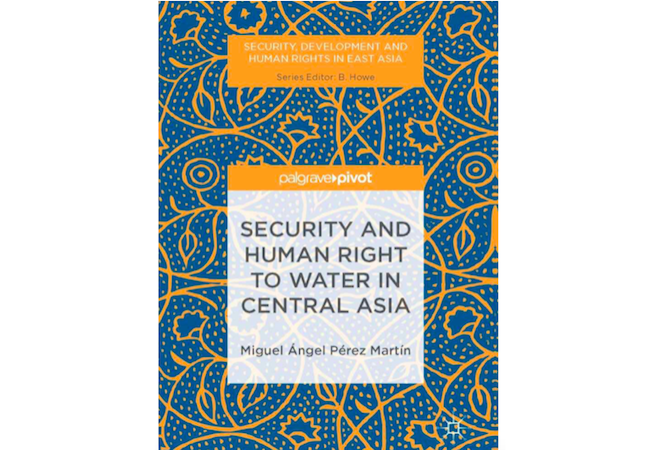
By Miguel Ángel Pérez Martín
The newly published book Security and Human Right to Water in Central Asia (Security, Development and Human Rights in East Asia) examines the impact and implications of the declaration of human right to water and sanitation access for human security in Central Asia. The most outstanding feature of this book is to introduce, within the field of security, the human right to water and sanitation as one of the possible central pillars of international peace and security; another important aspect is the analysis of water conflict from a multidimensional perspective (political, economic, environmental, social, etc.) connecting each of these dimensions to better understand the origin and nature of water conflicts and seek better solutions. This work discusses the impact of the declaration of human right to water and sanitation access and its implications for human security in Central Asia, as well as the policies of multilateral security organizations (NATO; SCO; OSCE, CSTO) with respect to the water resources in this region of the world. This research begins by highlighting the historical importance of water in political, economic and social affairs in Central Asian societies. It analyzes the current risks and threats arising from a mismanagement of water resources in Central Asia (Amu Darya basin) through the different dimensions of human security (environmental, economic, social and political) and its impact on the human right to water and sanitation. It establishes how the current model of energy and agricultural governance and the loss of cooperation between the riparian states of Amu Darya are the origin of water conflicts and violation of the human right to water and sanitation of millions of people. Subsequently this study identifies various actors involved in water issues, paying particular attention to multilateral security organizations; it investigates whether international security organizations and security policies have been effective in addressing the chronic water crisis in Central Asia. Finally, the author proposes the creation of a security community based on the principles of the human right to water (accountability, participation, non-discrimination, transparency, sustainability, etc) in order to solve water conflicts. Deutsh says that “a community consists of persons who have learnt to communicate and understand each other beyond the simple exchange of goods and services”. States and organizations, apart from widening and empowering their political, economic or cultural exchanges, must create a community language that leads, through a social learning, to a system of collective beliefs and perceptions with the aim of creating a common identity to promote mutual trust and to enable all kinds of conflict resolution processes pacifically. As a consequence, the region’s multilateral security organizations should promote practices and values to build up identity and trust around the management of water resources, leaving aside some security concepts as the dilemmas currently controlling the relations between Central Asian states in the matter of water resources, and replacing these values by those of the collective security community.
The book is also available for purchase through the publisher.
Miguel Ángel Pérez Martín, PhD, is teacher and researcher at the Institute of Development and Cooperation, Complutense University of Madrid, Spain and coordinator of the Observatory of Human Right to Water. He is a specialist in water resources and Eurasian studies and has conducted research in Iran, the UK, Germany, and Kazakhstan.




